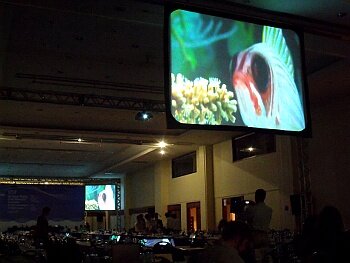The End of the Line was shown in remarkable circumstances this week – in the official convention hall of a hotel near Recife, Brazil, where the world’s oldest whole-ocean fisheries management organisation was meeting to set controversial catch limits for the Atlantic’s dwindling populations of tuna, swordfish and sharks.

The End of the Line is shown at the International Commission for the Conservation of Atlantic Tunas meeting in Brazil
It took a certain amount of persuasion. It needed the crucial backing of the Brazilian chairman of the meeting, Prof Fabio Hazin (the curiosity of these meetings is that the chairmen are usually enlightened while the contracting parties from the fishing nations, which include Libya, are anything but).
It also needed a mysterious process of agreement from heads of delegations sitting in closed session.
The chief scientist, Dr Gerald P Scott, an American, was consulted, and pronounced in a neutral kind of way that the idea of showing a film, after and outside the official business of the day, was something that had been done before - though quite when nobody could remember - and might provide an opportunity some delegates might not otherwise get to see it. The film was duly shown in the convention centre, on official equipment.
Was this a sign that the dysfunctional International Commission for the Conservation of Atlantic Tunas – often known to its critics as the International Conspiracy for Catching All The Tuna – was at last beginning to listen to voices outside the fishing industry, such as the citizens who actually pay them to manage the sea? No one could say for sure.
About 40 people postponed their need for a beer or managed to slip out of meetings to see the film. Some of these, inevitably, were the already converted: conservationists who were seeing the film as an act of solidarity with its message.
Two Asian delegations stood around talking before filing out. But here and there, as you looked around, were some senior delegation folk sitting in small groups including, significantly, most of the Spanish delegation. At the end, there was applause.
We were approached the next night by the secretariat requesting a second screening for delegations, principally Mexico, that had missed the screening we had organised because of meetings. So we were back by popular demand.
Could the message be getting out that our seas are a mess and ICCAT has failed for 40 years to tackle the problem of the depleting Atlantic ocean?
Whether or not this was a sign of changing times, for once this week the message got through.
Ends
![]()



0 Responses to “The End of the Line is shown at ICCAT”
Leave a Reply